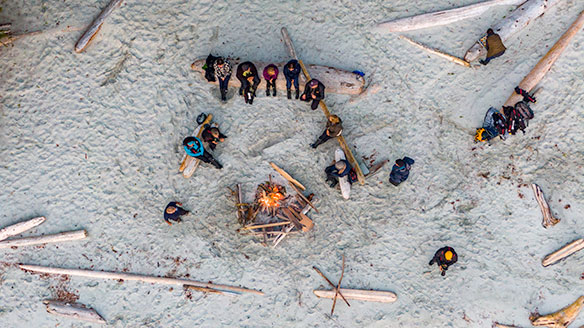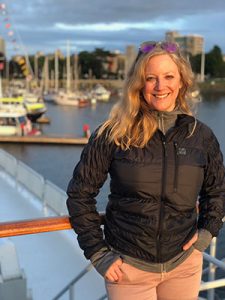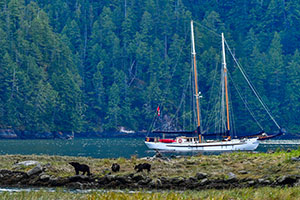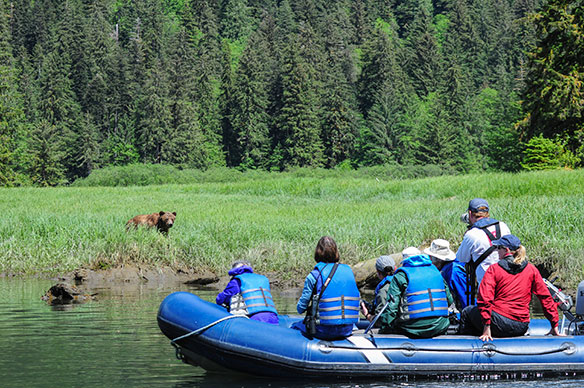
Planning for the light at the end of the tunnel

Canada’s travel and tourism industry – whether inbound or outbound – is made up of a few big players and a lot of small and medium size companies. Maureen Gordon is the co-owner of Maple Leaf Adventures, an award winning, small tour company and this week, she talks with Canadian Travel Press about how the company is managing its way through a global pandemic.
Maybe you can start by telling Canadian Travel Press’ readers about Maple Leaf Adventures … what’s its story? What does it do?
Maple Leaf Adventures is committed to creating a sustainable tourism industry in British Columbia and southeast Alaska.
We provide high-quality adventures, following the principles of eco-tourism, where we not only respect the environment and communities of our coast, but we give back to protect and regenerate, too.
The trips provide special access to the wildlife, landscapes, culture and nature of the coast, while providing the excitement of an adventure by yacht.
Everything at Maple Leaf Adventures reflects our core values of:
• environmental sustainability,
• celebration of our natural history,
• personalized and warm interactions with everyone,
• fostering the local economy,
• connections with science and discovery,
• leaving the world better than we found it, and general excellence.
This spectacular coast is our home. We and our all-local crew and guides are delighted to share the best of it with you.

Gordon
Rated one of the “Best Adventure Travel Companies on Earth” by National Geographic Adventure, the company provides an intimate ‘small-ship’ experience, taking travellers to Canada’s Great Bear Rainforest, Haida Gwaii, and Vancouver Island regions as well as Alaska.
Maple Leaf Adventures has provided conservation-focused voyages since 1986. Some – such as the Great Bear Rainforest – were once under the threat of destruction or are in need of protection. In 2012, Maple Leaf Adventures was awarded the Parks Canada Sustainable Tourism Award for promoting the appreciation and protection of Canada’s natural, cultural, and aesthetic heritage.
Two of the company’s expedition-style ships are heritage treasures, with their original construction dating back to the early 1900s. MV Swell is a converted tug, accommodating 12 guests in six private cabins. SV Maple Leaf is a classic, 92-foot schooner accommodating up to eight guests. The fleet’s newest addition, MV Cascadia, is a 138-foot luxury catamaran accommodating up to 24 guests.
These are unprecedented times for the travel and tourism industry and I’m wondering if you can talk a bit about how the global pandemic has impacted your company? Is it operating? Can it operate with the federal government ban on cruising in place? Has it had to reduce its staff? Bring CTP’s readers up to date on the company’s situation.
The pandemic has had an enormous on impact on us at Maple Leaf Adventures. Similar to almost all small tourism operators, we’ve been managing by taking on debt.
Transport Canada cancelled all passenger trips until July 2020 and only now are we permitted by Transport Canada to operate due to our small class of yacht. Border shutdowns have prevented our guests from outside Canada from reaching us as well. Other industry shutdowns have restricted access to our key destinations including wishes from indigenous governments not having tourists visit their territories. We are choosing to respect their wishes, which has severely affected our ability to operate and be successful as a business.
As a result, for the fall of 2020, we have curated a series of wilderness getaways accessible from Vancouver Island, targeting close-to-home travel for Canadians who can access us. We are fortunate that regularly, 50% of our guests are Canadians.
That said, what’s the future look like for Maple Leaf Adventures? What’s your plan for reopening … for moving forward?
We’ve updated our protocols for COVID-19 and operating as a small yacht we are similar to a small lodge in that we have the ability to operate safely, lots of space and un-ending fresh air in remote nature! We will be operating again this fall, with reduced capacity, to provide more space for our guests to maintain social distancing.
It’s very important to us to keep our crew and keep our ships working. Our expeditions are out in wild nature, therefore the ideal kind of holiday that guests are seeking right now. We’ve seen an increase in inquiries for family full ship charters, as well as locals who want to book a cabin escape into nature with us.
Are travel agents part of that plan? If they are, how can they work with Maple Leaf Adventures? How do they connect with the company?
We work with travel agents and encourage all agents to continue to reach us through our website at https://mapleleafadventures.com or by calling us.
What do agents need to know about your product and programs in order to sell them effectively? What kind of clients do they appeal to?
Our trips are for guests who like to learn, and who seek an alternative to mass travel. They like the natural world and they don’t mind if they’re walking in the rainforest and it starts to rain. They’re a higher-end experience, so they’re for people who seek that special relationship with a place and want to be guided by local experts.
As a follow up, do you do any agency training – or are you planning to do any – to help them sell your product and programs?
 Yes, we offer webinars to train agents.
Yes, we offer webinars to train agents.
Maybe you can talk a little bit about some of the challenges COVID-19 has created for your company and for the industry. Are there things that governments can do to help?
It’s huge. Where to start? Cash flow in the industry is paramount, and it’s the largest worry that people often do not understand. It would be great to receive support to help keep the small independent operators still working. Any support the government can provide with regards to policy issues, cancellation insurance, supporting and encouraging guests to rebook and not cancel completely, are all critically important to save our industry.
I think it’s critical for the country to understand that tourism is made up tens of thousands of small entrepreneurial businesses. They could be your neighbour or friend. These passionate little companies have been dealt the most severe blow the industry has seen to date and have not yet received specific support from the government. It’s the hardest hit industry, and a key element in Canada’s economy. We are fortunate that our guests are largely very informed and understanding but we hope that message can be spread to those who don’t yet understand that the burden of covid-19 is not the same as an airline overbooking a flight.
What kind of preparations has Maple Leaf Adventures put in place to prepare to reopen its business? Have new health and safety protocols been introduced onboard and as part of your operations going forward? Can you talk a bit about those initiatives?
Our industry sector has developed a 40-page practice and protocol document for safe operating during the pandemic. Each individual operator, including Maple Leaf Adventures has customized the content to our specific operation.
In addition, we’ve purchased extra technology and equipment including new cleaners to help our team safely sanitize properly. A new electro-statically charged fogger allows us to disinfect surfaces and fabrics in minutes. New practices and policies have also been put in place for what guests can expect on each trip (e.g., masks for when we’re in the shore boats heading to a beach) and who will are able to safely accept on board.
Conventional industry wisdom suggests that Canadians will travel in Canada this summer. Do you agree with this view? And, if you do, do you think there will be enough in the way of business/booking activity to help the industry weather at least a bit of the storm?
Yes, although the extent to which it helps depends on where the tourism operators are located. We are lucky in that already 50% of guests are from Canada – we feel we can operate at reduced capacity with trips this year for local Canadians only.
Other operators, however, that require air or ferry travel to reach, both of which are currently cancelled and shut down, may not benefit much from Canadian travellers this year. Also, a number of very high-end businesses in our wildlife tourism industry rely on visitors from other countries and it’s very difficult for them to replace revenue without having international visitors.
Last question … Do you see a light at the end of the tunnel?
There are so many uncertainties, however we know we will come out of this at some point. Environmentally sustainable trips in nature will be one of the first types to rebound strongly, and while we plan on there being a light at the end of the tunnel, we cannot make any assumptions about whether we’re really seeing it just yet.

